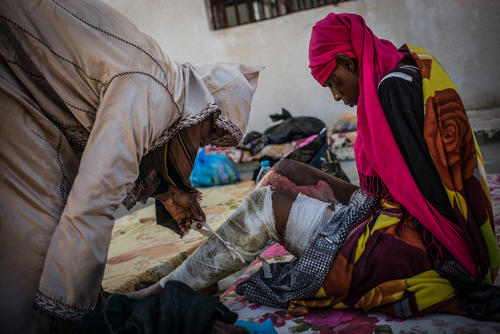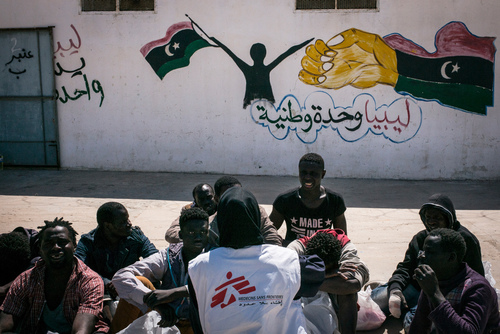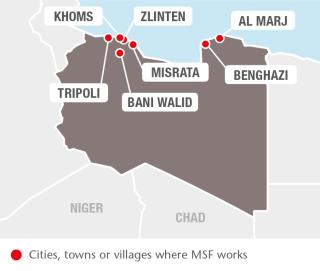
30,200
30,2
23,400
23,4
Despite the instability and ongoing conflict, Libya remained a destination for migrant workers from across the African continent and a transit country for migrants, asylum seekers and refugees attempting to cross the Mediterranean and reach Europe.
In 2017, MSF provided medical assistance to migrants and refugees arbitrarily held in detention centres that are nominally under the control of the Ministry of the Interior. Most medical complaints were related to the conditions in which they were detained, with overcrowding, inadequate food and drinking water, and insufficient latrines resulting in respiratory tract infections, musculoskeletal pain, skin diseases such as scabies, and diarrhoeal diseases.
MSF publicly called for an end to the arbitrary detention of migrants and refugees in Libya, calling it harmful and exploitative. MSF denounced European governments’ migration policies to seal off the coast of Libya and ‘contain’ migrants, asylum seekers and refugees in a country where they are exposed to extreme, widespread violence and exploitation.
In Tripoli, MSF conducted 17,219 medical consultations and referred 470 patients to secondary healthcare facilities. During October and November, a massive increase in the number of people detained caused extreme overcrowding and further deterioration of conditions inside detention centres there. The pressure was eased in December, when the International Organization for Migration repatriated thousands of people.
In Misrata, MSF supported the main hospital to improve infection control, and also scaled up its response to the needs of migrants and refugees in the area. Medical teams started working in five detention centres in Misrata, Khoms and Zliten, carrying out a total of 1,351 consultations and referring 49 patients for further treatment.
The majority of migrants and refugees in Libya live outside detention centres and, like the local communities, they are affected by the deterioration in public health facilities, which face drug and staff shortages. In Misrata, MSF opened an outpatient clinic offering free, primary healthcare and referrals to patients of all ages and nationalities.
In mid-2017, MSF also started to work in Bani Walid, reportedly a major transit hub for smugglers and traffickers. In partnership with a local organisation, MSF assisted people who had been held captive by criminal networks in the area but had managed to escape. Many had survived kidnapping for ransom, extortion and torture. The team provided 479 medical consultations to survivors and referred 24 patients to hospitals in Misrata and Tripoli.
In the east of the country, MSF ran a clinic in Benghazi in collaboration with a Libyan NGO, offering paediatric and gynaecology consultations to displaced and vulnerable people, as well as mental health support to children and families affected by trauma and violence. MSF ended its support of Al Abyar and Al-Marj hospitals in 2017 due to a reduction in the number of patients.
Patient Story
“I don’t know her name or even if she is still alive,” said photojournalist Guillaume Binet, who gained rare access to several detention centres in Libya.
“She was one of a group of women being held in the yard of a detention centre about 60 kilometres west of Tripoli. They were intercepted at sea by the Libyan coastguard while attempting to reach Europe. Many had severe burns on their legs. Sea water had splashed over the sides of the rubber dinghy and reacted with fuel that had spilled on the floor of the boat where the women were sitting.
I don’t know what happened to the woman with the pink scarf. But without the medical care she so desperately needed, I doubt she is still alive.”



















